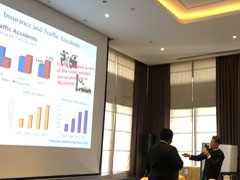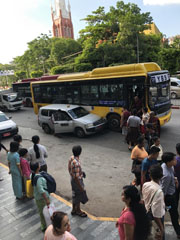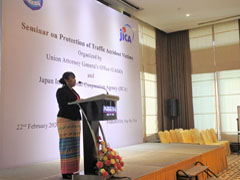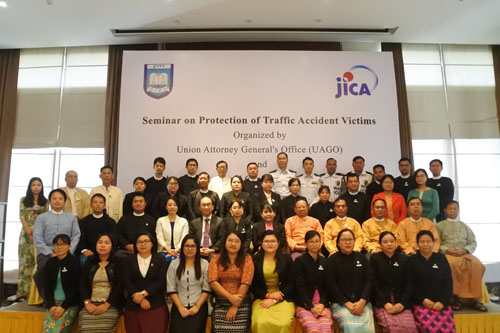- Home
- Countries & Regions
- Asia
- Myanmar
- Press Release
- JICA and Union Attorney General's Office take a lead of the discussion on protection of Traffic Accident Victims: Securing lives of the victims and their families from unexpected tragedy
Press Release
February 22, 2020
JICA and Union Attorney General's Office take a lead of the discussion on protection of Traffic Accident Victims: Securing lives of the victims and their families from unexpected tragedy
Imagine you got hit by a car on street and injured, got hospitalized, and were unable to work for a while. Do you think you can get sufficient remedy or compensation to reconstruct your live as you had enjoyed before the accident? The answer may be "no" in Myanmar, largely due to the ineffective legal framework and underdeveloped automobile insurance.
Together with the drastic motorization in Myanmar, the number of traffic accidents has been also rising. The number of deaths caused by traffic accidents is over 5,000 in 2017, surpassing the number of those in Japan, whose population is about twice as large as Myanmar. This shows protection of traffic accidents is the urgent social needs in Myanmar now.
To tackle this issue, the Japan International Cooperation Agency (JICA) and the Union Attorney General's Office (UAGO) jointly held the inter-organizational seminar to discuss how to provide sufficient protection to the traffic accident victims. The seminar invited relevant stakeholders such as the Union Parliament, the Supreme Court of the Union, the Ministry of Planning, Finance and Industry, the Ministry of Home Affairs and the Ministry of Transport and Communications.
In the seminar, the participants reviewed the basic legal framework including torts where the wrongdoers should pay sufficient compensation to the traffic accident victims. They also realized the significant role of automobile insurance in protection to the victims. In addition, they discussed how to establish sufficient legal frameworks or automobile insurance system, and what else could be done to provide enough protection to the traffic accident victims.
JICA has been working in Myanmar under the concept of "human security" which emphasizes lives of individuals, especially for the vulnerable ones. Everyone may become one of those "vulnerable ones" once they get involved in a traffic accident and deprived of "normal lives" in a chance. With all those backgrounds, JICA strongly believes that providing sufficient protection to the traffic accident victims is one of the most important agenda for achieving "human security" in this rapidly motorizing society of Myanmar.
Since November 2013, the JICA Judicial and Legal Project has been cooperating with UAGO and SCU, who have both been making great efforts to establish the rule of law in Myanmar. Currently, the project is working to assist UAGO and SCU on various fields, such as a). Court-led mediation, which is started in four pilot courts around Naypyitaw since March 2019 in order to realize fair and efficient procedures, b). Drafting court regulations for intellectual property disputes, c) Development of a business-law-related casebook and its training, d) Support for establishing effective regular training systems, e). Formulation of commercial contract guidelines such as joint venture contract /land lease contract.
 Mr. Komatsu Kenta, JICA Legal Advisor, explained the increase of traffic accident in Myanmar, and introduced the necessary legal frameworks for victim protection.
Mr. Komatsu Kenta, JICA Legal Advisor, explained the increase of traffic accident in Myanmar, and introduced the necessary legal frameworks for victim protection.
 A taxi crashed into a bus in Yangon downtown. Traffic accidents are happening average of 45 cases a day in whole Myanmar, killing 15 persons every day.
A taxi crashed into a bus in Yangon downtown. Traffic accidents are happening average of 45 cases a day in whole Myanmar, killing 15 persons every day.
 Dr. Daw Thi Da Oo, the Permanent Secretary of UAGO, emphasized necessity to provide protection to the victims through affordable and workable legal system and automobile insurance.
Dr. Daw Thi Da Oo, the Permanent Secretary of UAGO, emphasized necessity to provide protection to the victims through affordable and workable legal system and automobile insurance.
 The seminar also invited the Union Parliament, the Supreme Court of the Union, the Ministry of Planning, Finance and Industry, and the Ministry of Home Affairs and the Ministry of Transport and Communications for inter-organizational discussions.
The seminar also invited the Union Parliament, the Supreme Court of the Union, the Ministry of Planning, Finance and Industry, and the Ministry of Home Affairs and the Ministry of Transport and Communications for inter-organizational discussions.

- Asia
- Southeast Asia
- Cambodia
- Indonesia
- Laos
- Malaysia
- Myanmar
- Philippines
- Thailand
- Timor-Leste
- Viet Nam
- East Asia
- China
- Mongolia
- Central Asia and the Caucasus
- Armenia
- Azerbaijan
- Georgia
- Kyrgyz Republic
- Tajikistan
- Uzbekistan
- South Asia
- Afghanistan
- Bangladesh
- Bhutan
- India
- Maldives
- Nepal
- Pakistan
- Sri Lanka
- Oceania
- Latin America
- Africa
- Middle East
- Europe
- Asia
- About JICA
- News & Features
- Countries & Regions
- Our Work
- Thematic Issues
- Types of Assistance
- Partnerships with Other Development Partners
- Climate Change / Environmental and Social Considerations
- Evaluations
- Compliance and Anti-corruption
- Science and Technology Cooperation on Global Issues
- Research
- JICA Development Studies Program / JICA Chair
- Support for the Acceptance of Foreign HRs / Multicultural and Inclusive Community
- Publications
- Investor Relations
